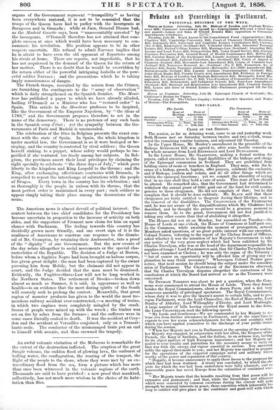The American news is almost devoid of political interest. The
contest between the two chief candidates for the Presidency has become uncertain in proportion to the increase of activity on both sides, and the supporters of Fremont now claim for him an equal chance with Buchanan. The feeling towards this country has decidedly grown more friendly, and one overt sign of it is the readiness of Americans to construe our response to the dismis- sal of Mr. Crampton, by retaining their Ambassador, into a proof of the " dignity " of our Government. But the new events of the day relate altogether to social movements or the special cha- racteristics of the Republic. The decision of a Judge at Boston, before whom a fugitive Negro had been brought on habeas corpus, has given great delight : the man had been captured by the owner pursuing him from Mobile, but the claimant did not appear in court, and the Judge decided that the man must be dismissed. Evidently, the Fugitive-Slave-Law will not be long worked in the Northern States. The retirement of Brooks—broken down almost as much as Sumner, it is said, in appearance as well as health—is an evidence that the most daring spirits of the South will scarcely seek to prolong the contest. Meanwhile, that great region of monster products has given to the world the most tre- mendous railway accident ever constructed,—a meeting of trains, in which two engines were completely mingled by the crash. Scores of people were mixed up with the wreck ; the timber was set on fire by ashes from the furnace ; and the sufferers were in some eases literally cooked to death. It was the accident at Croy- don and the accident at Versailles conjoined, only on a Transat- lantic scale. The conductor of the mismanaged train put an end to himself with arsenic, and thus crowned the tragedy.


































 Previous page
Previous page